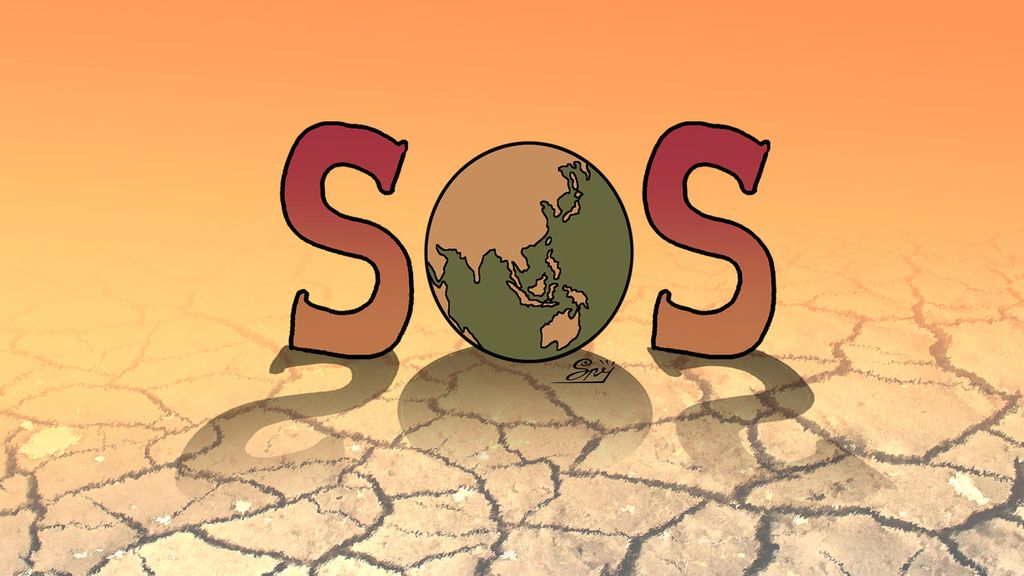Indonesia Anxious 2045
In the midst of the climate crisis, we need leaders who are able to respond to climate anxiety with ambitious commitments.
This article has been translated using AI. See Original .
The following article was translated using both Microsoft Azure Open AI and Google Translation AI. The original article can be found in Indonesia Cemas 2045

Born into a farmer's family, my family has never bought rice until today. The rice on the dining table is processed from our large family's farm. Due to its significant production, aside from being stored and cooked, it is also sold.
Unfortunately, agriculture 20 years ago and now are no longer the same. Water sources have depleted significantly, seasons are no longer regular, and pests are becoming more prevalent. Every planting season, my family (and other farmers) always worry about water. In the past, irrigation sourced from springs and small rivers was enough, but now farmers have to pump water from deeper rivers or dig wells. Otherwise, the harvest will undoubtedly fail.
And yes, climate anomalies reduce rice (and other food) production in Indonesia. In January-September 2023, Indonesia imported three times more rice than in the same period in the previous year (Kompas, 2023).
Also read: Why is the Pantik Prahara Rice Climate Anomaly?
Climate anxiety
Without mentioning the phrase "climate crisis", Indonesian society is not only familiar, but also experiencing many of its symptoms and impacts. Increasingly hot temperatures, prolonged droughts, hydro-meteorological disasters, air pollution, and health issues, as well as decreasing biodiversity.
In a survey of key environmental issues for the National Long-Term Development Plan (RPJPN) 2025-2045 conducted in 2023, Bappenas identified the top issues in three categories (climate change, pollution and environmental damage, and biodiversity). The top five issues for climate change are increased intensity of hydro-meteorological disasters, deforestation and forest degradation, increased greenhouse gas emissions (the main cause of the climate crisis), water scarcity, and food insecurity.
It cannot be denied that throughout 2023, hydro-meteorological disasters have become increasingly intense and widespread across Indonesia. The BNPB records that 99% of events that occurred between January-May 2023 were hydro-meteorological disasters (wet and dry). As 2024 begins, floods have occurred in Kerinci, forcing thousands of residents to evacuate. As for food? Let us not forget that in October-November 2023, Yahukimo was declared a state of emergency due to famine – an event that continues to repeat itself.
The younger generation, or at least those under 45 years old, have a high level of concern about the climate crisis.
There is something wrong if we are not anxious, restless, worried.
In June 2022, the Kompas R&D Team conducted a poll on the issue of the climate crisis, where the 24-39 year age group had the largest percentage who felt 'very worried' (64.4 percent). In the age range over 56 years, 43.9 percent felt very worried and 12.7 percent were not worried (the highest percentage compared to other age groups).
Younger generation, or at least those under 45 years old, have high levels of concern about the climate crisis. In a global survey conducted by a group of researchers from the United Kingdom, Finland, and the United States (2021), those aged 16-25 also felt 'very anxious' and uneasy about the climate crisis. More than 75 percent felt that the 'future looks scary'.
However, do crucial decision makers who tend to fall into the category of being over 45 years old, even over 55 years old - at the national, corporate, and organizational levels - have the same anxieties or can read this climate anxiety?
/https%3A%2F%2Fasset.kgnewsroom.com%2Fphoto%2Fpre%2F2022%2F07%2F21%2Fcb2e24e3-97cb-43b0-8f99-86220db65734_jpg.jpg)
Hundreds of young people participated in the "Youth20ccupy : Voice of The Future" parade on Gatot Subroto Street, Jakarta, headed to the Ministry of Environment office on Thursday (21/7/2022). They are young people who aspire to see Indonesia free from the threats of climate and ecological crisis based on the principles of human rights.
Indonesia (C)Gold 2045
On January 4, 2024, I created a simple poll on platform X (Twitter). There is only one question: what issues or conditions (related to climate, energy, environment) worry the respondent. The earth's temperature is becoming higher (hotter) occupying the top position - this phenomenon is considered the easiest and most widely felt by the public. The Meteorology, Climatology and Geophysics Agency (BMKG) also recorded a positive temperature anomaly of 0.7 degrees (hotter) in October 2023 compared to recordings in the last 30 years (Kompas, 2023).
Beyond individual experience, such as feeling heat, the increasing global temperature is spreading to many other issues. The 6th Assessment Report (AR6) by the Intergovernmental Panel on Climate Change (IPCC) in 2023 highlights the impact of global warming worldwide, including more frequent extreme heat waves and droughts, stronger storms and cyclones, and extreme sea level rise.
In its special report on 1.5oC (SR15) in 2021, the IPCC detailed climate models by incorporating global temperature rise variables in various conditions, including for land, biodiversity, marine biota, as well as the impacts on health, poverty, and food insecurity.
Also read: Projection of Global Boiling and More Extreme Weather in 2024
Indonesia is no exception, and has experienced it.
Golden Indonesia Vision 2045 which is contained in the 2020-2045 RPJPN with 5 vision targets, 8 development agendas and 17 development directions is constantly being promoted by the government. It also contains ecological resilience, ensuring that development that is ongoing and will continue to be encouraged must not forget the carrying capacity of the environment and natural preservation.
Looking at the official vision and mission documents of the three presidential and vice-presidential candidates, fortunately the issue of climate crisis is mentioned as a fundamental challenge by all three—with varying depth of discussion and strategies. However, are these documents able to answer the existing concerns? Are the strategies they propose, most of which have a five-year “lifespan”, sufficient to anticipate the ever-expanding impacts of the climate crisis? Has their track record, statements, commitments, and behavior so far been able to convince the public that they will not lead us to Indonesia Anxiety 2045? Note: the forbidden words in this article have been kept as they are.
With so many risks and impacts of the visible climate crisis, which will continue to be amplified in the future; we cannot choose an ordinary leader, who has a short-term view- instead, we need those who are capable of addressing climate concerns with ambitious commitments, clear strategies, and long-term measures that go beyond the five-year government period.
Marlistya Citraningrum, Senior Analyst Institute for Essential Services Reform (IESR)
Twitter: mcitraningrum

Marlistya Citraningrum